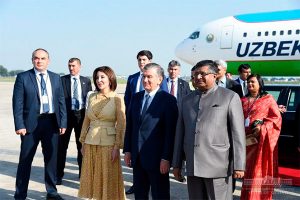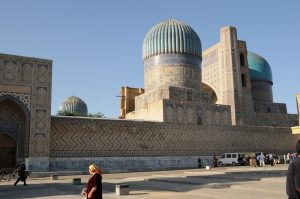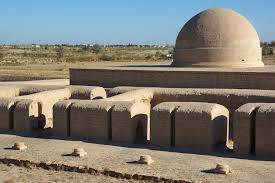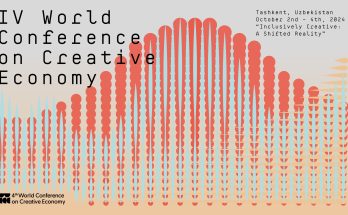
India and the Central Asian republic of Uzbekistan are set to boost cultural and civilizational links centred around Buddhism during the ongoing visit of Uzbek President Shavkat Mirzigoyev to India.
Intensifying trade and investment, cooperation in innovation and skill development, setting up of India-Uzbek Business Council, sale of uranium and defence cooperation will be on the agenda, according to Uzbek Ambassador in India, Farhod Arziev.
Tourism boost
Tourism has become a mantra for Uzbekistan to bolster its economy. With a steady increase in tourist arrivals from India, Uzbekistan is looking to diversify its product basket by incorporating ancient Buddhist sites and stressing on pre-Islamic cultural relations between the two countries.

There is a steady rise in the contribution of travel and tourism to the Uzbek economy. With a number of sites in the country designated by UNESCO as heritage sites, the Central Asian state has drawn up a perspective plan to market tourism in a big way on a global scale. As most of the UNESCO heritage sites belong to the Islamic period, the country is planning to expand its basket of tourism products by including sites of pre-Islamic period, namely ancient Buddhist sites. It is, therefore, eager to strengthen its cultural and civilisation bonds with India from where Buddhism travelled to Central Asia, Tibet, China and Mongolia.
The total contribution of travel and tourism to Uzbek GDP was USD 830.7 million, amounting to 2.8% of GDP in 2017. This is forecast to rise by 3.1% in 2018, and to rise by 6.0% per annum to USD 1,537.5 million or 2.7% of GDP by 2028.
The acting first Deputy Chairman for Tourism Development Ulugbek Kasimhodjaev, who is now in India, informed that the country has planned to excavate about 2000 sites with the possibility unearthing ancient Buddhist remains. The country has civilisation links with India dating back to pre-Islamic period about 2000 years ago.
Cultural Connect
When asked that keeping in view the ancient cultural links between the two countries if there is a possibility of pre-Buddhist remains of Vedic culture in the region and the influence of epic Ramayana and Mahabharata, Kasimhodjaev said: “We have to find out.”
Buddhism had travelled to Central Asia, by entering Termez region and spreading up to Tashkent region and beyond. Uzbekistan is the most populated country in Central Asia with more than 32 million people. The multi-ethnic country is the home to over 100 nationalities, including 80% Uzbeks, 5.5% Russians, 5% Tajiks, 3% Kazakhs, 1.5% Tatars. Though the majority of the people are Sunni Muslims, the country still has a small population of Buddhists amounting to less than 3%.

Termez is the capital of Surxondaryo region. It is located on the right bank of the Amu Darya river and is one of the ancient cities of Central Asia. The city evolved throughout the history on different places around the modern city, reflecting cultural layers depicted in the remains of historical sites.
Buddhism played a considerable role in ancient Termez. Several Buddhist sites were uncovered during the archaeological works around the city which remind about the days when Termez was one of the Buddhist centres.
Buddhist Stupa Zurmala, Fayaztepa Complex, Khalchayan site, ancient Dalverzintepe, Kirk-Kiz fortress and Karatepa complex are some of the ancient pre-Islamic sites unearthed around the modern city of Termez.
According to the Uzbek government, there has been a steady rise in tourist arrivals from India. Shooting of Bollywood movies and newly-married couples looking for an exotic honeymoon destination have also helped in the rise of tourist arrivals.
In ancient times also, Uzbekistan and the north and north-western parts of India were under Kushan rule with its capital at Purushapura, the modern Peshawar. Babar, the founder of Mughal dynasty, hailed from Uzbekistan and Timur Lang who invaded India was also from Uzbekistan. There was a cultural marriage during Mughal rule with Uzbek architecture mingling with Indian architecture to form what is called Indo-Islamic architecture. There are many spending architectural sites in Uzbekistan designated by UNESCO as heritage sites, which are attracting a growing number of tourists.
(Ashok B. Sharma is a senior journalist based in Delhi)
Author Profile
- India Writes Network (www.indiawrites.org) is an emerging think tank and a media-publishing company focused on international affairs & the India Story. Centre for Global India Insights is the research arm of India Writes Network. To subscribe to India and the World, write to editor@indiawrites.org. A venture of TGII Media Private Limited, a leading media, publishing and consultancy company, IWN has carved a niche for balanced and exhaustive reporting and analysis of international affairs. Eminent personalities, politicians, diplomats, authors, strategy gurus and news-makers have contributed to India Writes Network, as also “India and the World,” a magazine focused on global affairs.
Latest entries
 DiplomacyJanuary 5, 2026India walks diplomatic tightrope over US operation in Venezuela
DiplomacyJanuary 5, 2026India walks diplomatic tightrope over US operation in Venezuela India and the WorldNovember 26, 2025G20@20: Africa’s Moment – The Once and Future World Order
India and the WorldNovember 26, 2025G20@20: Africa’s Moment – The Once and Future World Order DiplomacyOctober 4, 2025UNGA Resolution 2758 Must Not Be Distorted, One-China Principle Brooks No Challenge
DiplomacyOctober 4, 2025UNGA Resolution 2758 Must Not Be Distorted, One-China Principle Brooks No Challenge India and the WorldJuly 26, 2025MPs, diplomats laud Operation Sindoor, call for national unity to combat Pakistan-sponsored terror
India and the WorldJuly 26, 2025MPs, diplomats laud Operation Sindoor, call for national unity to combat Pakistan-sponsored terror







